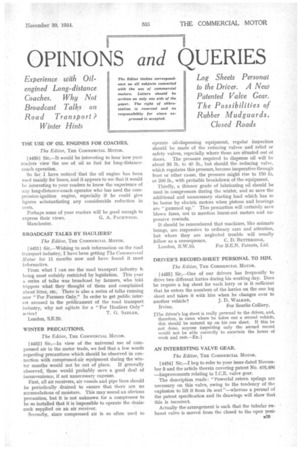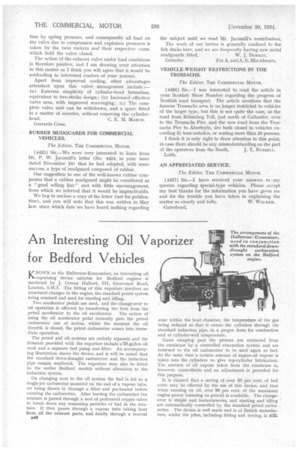OPINIONS and
Page 57

Page 58

If you've noticed an error in this article please click here to report it so we can fix it.
QUERIES
THE USE OF OIL ENGINES FOR COACHES.
The Editor, rce THE COMMERCIAL MOTOR.
[4430] Sir,—It would be interesting to hear how your readers view the use of oil as fuel for long-distancecoach operation.
So far I have noticed that the oil engine has been used mainly for buses, and it appears to me that it would be interesting to your readers to know the experience of any long-distance-coach operator who has used the compression-ignition engine, especially if he could give figures substantiating any considerable reduction in costs.
Perhaps some of your readers will be good enough to express their views. G. A. PACKWOOD. Manchester.
BROADCAST TALKS BY HAULIERS?
The Editor, THE COMMERCIAL MOTOR.
[4431] Sir,—Wishing to seek information on the road transport industry, I have been getting The Commercial Motor for 11 months now and have found it most informative.
From what I can see the road transport industry ts being most unfairly restricted by legislation. This year a series of talks was broadcast by farmers, who told trippers what they thought of them and complained about litter, etc. There is also a series of talks running now "For Farmers Only." In order to get public interest aroused in the prEdicament of the road transport industry, why not agitate for a "For Hauliers Only"
series? T. G. SADLER. London, S.E.20.
WINTER PRECAUTIONS.
The Editor, TELE COMMERCIAL MOTOR.
[44321 Sir,—In view of the universal use of compressed air in the motor trade, we feel that a few words regarding precautions which should be observed in connection with compressed-air equipment during the winter months would not be out of place. If generally observed, these would probably save a good deal of inconvenience, if not unnecessary expense.
First, all air receivers, air vessels and pipe lines should be periodically drained to ensure that there are no accumulations of moisture. This may sound an obvious precaution, but it is not unknown for a compressor to be so installed that it is impossible to operate the draincock supplied on an air receiver.
Secondly, since compressed air is so often used to operate oil-dispensing equipment, regular inspection should be made of the reducing valves and relief or safety valves, especially where these are situated out of doors. The pressure required to dispense oil will be about 30 lb. to 40 lb., but should the reducing valve, which regulates this pressure, become inoperative through frost or other cause, the pressure might rise to 150 lb. or 200 lb., with probable breakdown of the equipment.
Thirdly, a thinner grade of lubricating oil should be used in compressors during the winter, and so save the additional and unnecessary starting load which has to be borne by electric motors when pistons and bearings are "gummed up." This precaution will certainly save blown fuses, not to mention burnt-out motors and expensive rewinds.
It should be remembered that machines, like animate beings, are responsive to ordinary care and attention, but where they are neglected trouble will usually
follow as a consequence. C. D. BETTERIDGE,
London, N.W.10. For B.E.N. Patents, Ltd.
DRIVER'S RECORD-SHEET PERSONAL TO HIM. The Editor, THE COMMERCIAL MOTOR.
[4433] Sir,—One of our drivers has frequently to drive two different lorries during his working day. Does he require a log sheet for each lorry or is it sufficient that he enters the numbers of the lorries on the one log sheet and takes it with him when he changes over to another vehicle? J. D. WALKER, For Sourlie Colliery.
[The driver's log sheet is really personal to the driver, and, therefore, in cases where he takes out a second vehicle, this should be entered up on his one sheet. If this be not done, anyone inspecting only the second record would not be able correctly to ascertain the hours of work and rest—En.] AN INTERESTING VALVE GEAR.
The Editor, THE COMMERCIAL MOTOR.
[4434] Sir,—I beg to refer to your issue dated November 9 and the article therein covering patent No. 416,496 —Improvements relating to I.C.E. valve gear.
The description reads : "Powerful return springs are necessary on this valve, owing to the tendency of the explosion to lift it from its seat "—whereas a perusal of the patent specification and its drawings will show that this is incorrect
Actually the arrangement is such that the tubular exhaust valve is moved from the closed to the open nosiis39
tion by spring pressure, and consequently all load on the valve due to compression and explosion pressures is taken by the twin rockers and their respective cams, which hold the valve closed.
The action of the exhaust valve under load conditions is therefore positive, and I am drawing your attention to this matter as I think you will agree that it would be misleading to interested readers of your journal.
Apart from improved cooling, other advantages attendant upon this valve arrangement include :— (a) Extreme simplicity of cylinder-head formation, equivalent to two-stroke design ; (b) Increased effective valve area, with improved scavenging; (c) The complete valve unit can be withdrawn, and a spare fitted in a matter of minutes, without removing the cylinder
head. C. E. M. MARCH. Gerrards Cross.
RUBBER MUDGUARDS FOR COMMERCIAL VEHICLES.
The Editor, THE COIAMERCIAL MOTOR.
[4435) Sir,—We were very interested to learn from Mr. P. W. Jacomill's letter (No. 4424, in your issue dated November 16) that he had adopted, with some success, a type of mudguard composed of rubber.
• Our suggestion to one of the well-known rubber companies that a rubber mudguard might be considered as a "good selling line" met with little encouragement, from which we inferred that it would be impracticable.
We beg to enclose a copy of the letter (not for publication), and you will note that this was written in May last, since which date we have heard nothing regarding the subject until we read Mr. Jacomill's contribution. The work of our lorries is generally confined to the fish docks here, and we are frequently having new metal
mudguards fitted. W. J. DORKIN,
Grimsby. ' For A. and A. E. Blackbourn.
VEHICLE-WEIGHT RESTRICTIONS IN THE TROSSACHS.
The Editor, THE COMMERCIAL MOTOR.
[4436] Sir,—I was interested to read the article in your Scottish Show Number regarding the progress of Scottish road transport. The article mentions that the famous Trossachs area is no longer restricted to vehicles of the larger type, but this is not quite the case, as the road from Kilmahog Toll, just north of Callander, over to the Trossachs Pier, and the new road from the Trossachs Pier to Aberfoyle, a".te both closed to vehicles exceeding 33. tons unladen, or seating more than 20 persons.
I think it is only right to draw attention to this point, in case there should be any misunderstanding on the part
of the operators from the South, J. T. RUSSELL. Leith.
AN APPRECIATED SERVICE.
The Editor, THE COMMERCIAL MOTOR.
[44371 Sir,—I have received your answers to my queries regarding special-type vehicles. Please accept my best thanks for the information you have given me and for the trouble you have taken in explaining the
matter so clearly and fully. W. WALKER. 'Gateshead.




































































































